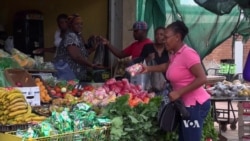Most Africans still buy their food at teeming, chaotic open-air food markets that would make many hygiene-conscious Westerners squirm. But a new study from the International Livestock Research Institute released on January 27 has yielded a surprising finding: that the milk and meat from these informal markets is often fresher -- and safer -- than what is found in the Western-style African supermarkets that are spreading across the continent.
Delia Grace, who leads the food safety program at the Nairobi-based organization, said in a statement that the study looked at eight countries, including the West Africa nations of Mali and Ghana, the East Africa nation of Kenya and the southern African coastal nation of Mozambique.
"We are wrong to think that we can just adopt solutions developed in wealthy countries that favor large commercial operations over small producers," she said.
It’s an unexpected conclusion that may bolster the continent’s informal food sector, which has long been the main source of food for many Africans -- especially for the poor, for those in rural communities and for people with few transport options. ILRI estimates that informal markets still supply between 85 and 95 percent of all food consumed in sub-Saharan Africa. And their supremacy is unlikely to be dented by the continent’s spreading supermarket chains: by 2040, ILRI estimates, informal markets will still supply up to 70 percent of consumers’ demand.
The organization also notes that small markets also have a necessary place in the economy.
“Attempts to make food safer by enforcing high standards can have unwanted effects, such as preventing small farmers and women from earning income from their work,” the report said.
Supermarkets say they are super safe
Supermarkets in South Africa, the continent’s economic hub, say they have strict standards for food safety. The nation’s largest supermarket conglomeration, the Shoprite Group, said they not only follow legal regulations, but set the bar higher.
“We test labels to ensure compliance with legislation as well as internal standards,” the company said in a report given to VOA News. “Food labels have to meet stringent legal requirements. All food and non-food local, imported and own-brand labels are viewed and approved on a daily basis to ensure compliance.”
But even the chains are not bulletproof.
Last year, South African packaged goods company Tiger Brands withdrew a range of sauces and rice products after finding traces of colorants that have been deemed toxic and carcinogenic. And pet food manufacturer Foodcorp was forced to recall a shipment of dry dog food from supermarkets because the kibble was contaminated with a deadly toxin -- commonly known as “vomitoxin” -- that causes vomiting and low weight gain in dogs.
And in 2013, South Africans were shocked to learn that their beef and sausages often actually contain water buffalo, donkey and goat meat, and common allergens gluten and soya, according to a study by top food scientists.
“This study confirms that the mislabeling of processed meats is commonplace in South Africa and not only violates food labeling regulations but also poses economic, religious, ethical and health impacts,” said study author Louwrens C. Hoffman.
Small suppliers also say safety is a priority
In Nairobi, Kenya’s capital, informal sellers say they are also concerned about food safety. Dairy farmer Simon Kinyanjui said he hadn’t seen a health inspector in at least two years, but said he takes precautions.
“I make sure the milking water is boiled and he washes his hands before milking and so there is no single day we have had complaints from the customers of stale milk,” he told VOA News.
Milk vendor Christine Wamboi said she then takes an additional step.
“When I receive the milk I boil it first to confirm the freshness,” she said.
For many Africans, where they buy their food is not a choice so much as a necessity. Informal markets often offer lower prices and greater convenience.
The researchers noted that these open air markets are not just vital, they may even be, well, cool. After all, researchers noted, informal markets are the embodiment of an aesthetic and environmental movement that has spread like wildfire in wealthy Western nations - the trend of eating locally sourced products, often bought directly from the producers.
Africa’s markets, Grace said, “in many ways mirror the 'locavore' trend.”
VOA News cameraman Amos Wangwa contributed to this report from Nairobi.





